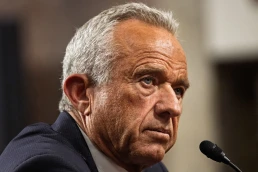Reckless funding cuts have dealt a significant blow to ongoing research, derailing NIH-funded clinical trials on antivirals and immunotherapies for Long COVID, halting large-scale cohort studies that track patient outcomes, and stalling the development of new diagnostics to improve detection and classification.
By Hayley Brown, Center for Economic and Policy Research
During his confirmation hearings to serve as Secretary of Health and Human Services (HHS), Robert F. Kennedy Jr. emphatically pledged to prioritize tackling Long COVID, a debilitating chronic condition that develops after COVID-19 infections and leaves many patients with lasting symptoms, such as fatigue, brain fog, and respiratory problems. Sen. Todd Young (R-Indiana) asked Kennedy if he would commit to funding research into treatments and diagnostics for Long COVID. Kennedy’s response? “Absolutely, senator, with enthusiasm.”

Fast forward to August 2025, and Kennedy has dismantled not only federal COVID prevention programs but also much of the research infrastructure devoted to understanding and treating Long COVID. He closed the Office of Long COVID Research and Practice, a central coordinating body established in 2023 to unify agency efforts on Long COVID, and failed to meaningfully replace it. His sweeping reorganization of HHS eliminated or consolidated key centers essential for disease surveillance and chronic illness response, including the National Center for Chronic Disease Prevention and Health Promotion. Reckless funding cuts have dealt a significant blow to ongoing research, derailing NIH-funded clinical trials on antivirals and immunotherapies for Long COVID, halting large-scale cohort studies that track patient outcomes, and stalling the development of new diagnostics to improve detection and classification.
Long COVID is a chronic, multisystem condition that follows COVID‑19 infection. It can arise regardless of the severity of the initial illness and is characterized by symptoms that may persist or emerge weeks to months after the acute phase of infection. Researchers have drawn parallels between Long COVID’s impact and that of a stroke or Parkinson’s. Long COVID also shares similarities with other post-viral syndromes such as myalgic encephalomyelitis/chronic fatigue syndrome (ME/CFS), which similarly involve long-term fatigue and autonomic dysfunction. Studies have shown that both Long COVID and ME/CFS can lead to quality-of-life impairments that outstrip many advanced cancers.
Recent Posts
How to Organize Safely in the Age of Surveillance
February 22, 2026
Take Action Now From threat modeling to encrypted collaboration apps, we’ve collected experts’ tips and tools for safely and effectively building a…
‘The Siege Must Be Broken’: Countries Called to Ship Fuel to Cuba After Trump Tariffs Struck Down
February 21, 2026
Take Action Now The US Supreme Court’s ruling “implies that Trump’s recent order imposing tariffs on countries selling oil to Cuba exceeds the…
Elite Depravity in Imperial Decline, A Zero Hour Conversation With Richard Wolff
February 20, 2026
Take Action Now “The system self-selects for psychopathy… the most sociopathically obsessive competitor and accumulator of personal power and…
Economics of Health For All: The Plan to Put Health at the Heart of the Global Economy
February 20, 2026
Take Action Now At the World Health Assembly in May, member states may endorse an unprecedented strategy declaring that health is not a cost – but…




